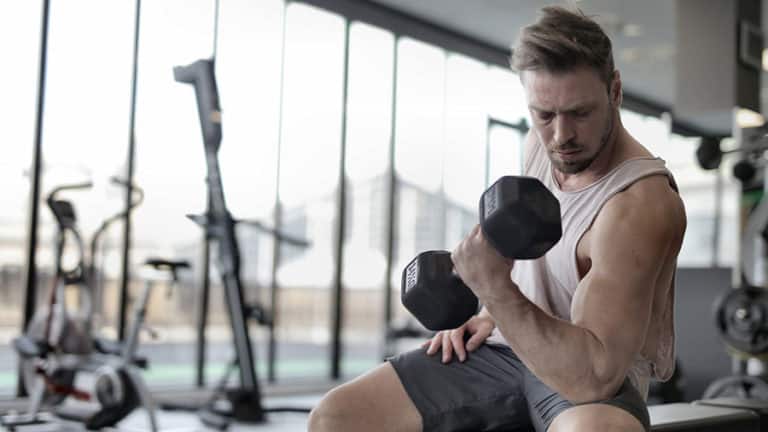How to push heavier in the bench press?
The bench press is one of the most popular exercises in strength training. It involves many muscles of the upper body, from the pectoral muscles to the triceps, shoulders, biceps, trapezius and abdominals. But many weight trainers are stagnant and wonder how to progress in bench press. In this article, I give you my tips and methods to improve and push heavier bench press.
Contents
How to improve your bench press?
Whether it is through my experience of sports coach or in the comments of the blog or the YouTube channel, three questions come up regularly:
- How to push heavier in the bench press?
- How to do a max in the bench press?
- How to progress in bench press ?
All of these questions are legitimate, and every athlete who wants to progress in bodybuilding must have already asked them.
To answer this problem, it is necessary to know how to reconcile the work of the pectorals and the progression. This requires a certain number of reflexes to adopt during your training sessions at the sports hall.
Take care of the starting position
If you have watched my videos, you now know how to properly set up on a weight bench to perform this exercise. Do not neglect this starting position, because it conditions the rest of the movement.
If you have any doubts, do not hesitate to consult one of the technical sheets that I put at your disposal for free on my website:
These 3 exercises and their variations will no longer hold any secrets for you since I show you in video how to do them and suggest variations to change your routine.
Your buttocks must remain on the bench. If this is not the case, it is because you are not doing this exercise properly. basic exercise. You will not be able to improve your bench press.
Your buttocks, shoulders and head are your support points on the bench. Make sure you keep them in contact throughout the exercise. It is important to get your body and brain used to acquiring automatisms. If you are a beginner, it is essential to focus on the placement of your body on the bench and your pecs in relation to the weight bar.
Breathing well
As with any technical movement in strength training, the breathing plays an essential role in the bench press. This aspect is often neglected by athletes, especially beginners. In reality, the success of your bench press depends largely on the way you breathe.
Your breath must accompany your movement. On the negative phase of the bench press (the descent of the bar), take a good breath. Then exhale at the moment when the effort is most intense, i.e. when you push the load.
Controlling your breathing is fundamental. Feel free to tell me in the comments if this tip has helped you improve your performance.
Upper back workout
For push heavier in the bench pressIt is not enough to build up your pecs. For gain strengthYou must learn to work other muscles, especially the antagonists.
To increase the volume of your pectoral muscles, you must also recruit the muscle fibers of the your upper back. The back, especially because of its stability, is one of the key muscle groups to improve in bench press. The stronger it is, the more you can increase the frequency and volume of training.
Consider the role of the triceps
In bench press, tight grip or inverted, the triceps are also largely solicited. It is therefore essential for any athlete to develop his triceps to progress.
On an inverted grip, you will work the external bundle of the triceps brachii, the anterior deltoid and the pectoralis major. On a tight grip, the muscles that will perform the effort will be those of the shoulder joints (anterior deltoid), the elbow and the shoulder girdle.
By carrying out multi-joint exercises like the tight grip bench press or the board press, you will gain amplitude to perform during your classic bench press sets.
Load less to gain in performance
Such advice may seem contradictory to your goal. But loading your bar less has three main benefits:
- you will be able to focus on the realization technique ;
- your recovery will be faster;
- you will reduce the risk of injury.
To do this, you must be able to put your ego aside. Don't try to impress your neighbor at the gym who asks you how much you push. Instead, think about perfecting your movement and sheathing, it's much more important.
To improve in the bench press and make lasting progress, you must realize that you cannot always give your best.
Set up progression cycles
As I mentioned above, to improve your bench press, you don't always have to train to push your maximum load. Charging less can help you improve. It is therefore essential to cycle your progress.
You don't want to be all out all the time, it's totally counterproductive. Powerlifters include in their training program weeks of deloadingso why not you?
The risk of always going for performance is that you will literally exhaust yourself, even injure yourself. Strength training is and must remain a pleasure. Pain and difficulty are certainly part of the sport, but pleasure must come first.
Take care of your nerve recoveryYou can do this by playing with the number of repetitions and sets, the weight of the loads and the rest times. Integrate "easier" sessions into your weight-training program. This will allow you to recover and push heavier on the bench press in future training sessions.
Work on explosiveness
Whether you're a beginner or an expert, developing your explosiveness will help you improve your performance. In some workouts, your goal should be to push the bar as fast as possible.
To do this, simply load your bar less (about 50 % of your maximum load). This will allow you to push faster and harder. In this situation, these are Type II fibers (also known as fast twitch fibers) that will be solicited. These fibers are those of the power and strength.
Don't try to lift your load slowly, because that won't make you stronger. Instead, be fast. Several methods can help you gain explosiveness:
- the Bulgarian method, which plays on the contrast of the loads (for example, link your bench press series with a series of slammed push-ups);
- the stato-dynamic method, which consists in using less important loads to make a pause of 2 or 3 seconds during the push (concentric phase).
Include negative repeats in the program
The eccentric contraction (or negative phase) is the exact opposite of the concentric contraction. In the bench press, the eccentric phase occurs when the barbell moves down towards your torso. The muscles will then stretch.
To get stronger in the bench press, it is important to include eccentric work in your weight training program. To do this, it is best to train with a partner. You will need to perform your bench press set to failure, then perform two or three more reps focusing on the eccentric phase. Your partner will then assist you in raising the bar (concentric phase).
Example of a program to progress in bench press
Whatever your training program, always start with a good warming up. To warm up the muscles used during the session, you can perform a first series without load, then increase the load gradually.
As we have seen, there are several methods for progressing in the bench press. The program below is just one example among others, intended for beginners, with three sessions per week. To benefit from a program perfectly adapted to your level and your objectives, I invite you to contact me directly.
Monday (pectorals, back and shoulders):
- bench press 5 x 5 repetitions
- pulls 3 x 10 repetitions
- tilted bust print 3 x 8 repetitions
- developed military 3 x 8 repetitions
- side elevations 3 x 10 repetitions
- pec deck 3 x 10 repetitions
Wednesday (legs):
- squats 4 x 8 repetitions
- Bulgarian squats 3 x 8 repetitions
- deadlift with outstretched legs 4 x 8 repetitions
- leg extension 3 x 12 repetitions
- calf extensions 3 x 12 repetitions
Friday (pectorals, biceps and triceps):
- bench press 5 x 5 repetitions
- split face down 3 x 12 repetitions
- pull over 3 x 12 repetitions
- curls at the desk with bar 3 x 8 repetitions
- bar to the forehead 4 x 10 repetitions
- bench press, tight grip 4 x 6 repetitions
Be careful, in addition to training, you will also need to adopt an appropriate diet to be better at bench press. The implementation of a diet of weight gain with adequate daily protein intake will help you progress faster. Hydration and sleep are two other factors to consider.
Conclusion
Pushing heavier in the bench press doesn't happen by chance. It requires patience. To progress, it is essential to apply certain methods and to build a personalized training program. In any case, don't overtrain and remember to adapt your training to your needs. recovery times between sets and sessions. And above all, keep in mind that it is not necessarily necessary to push heavier in weight training, except if you are doing bodybuilding or powerlifting. Very often, it is a question of ego, especially on this exercise of the bench press. But working with heavy loads can be counterproductive depending on your goals and lead to injuries that will slow down your progress.







